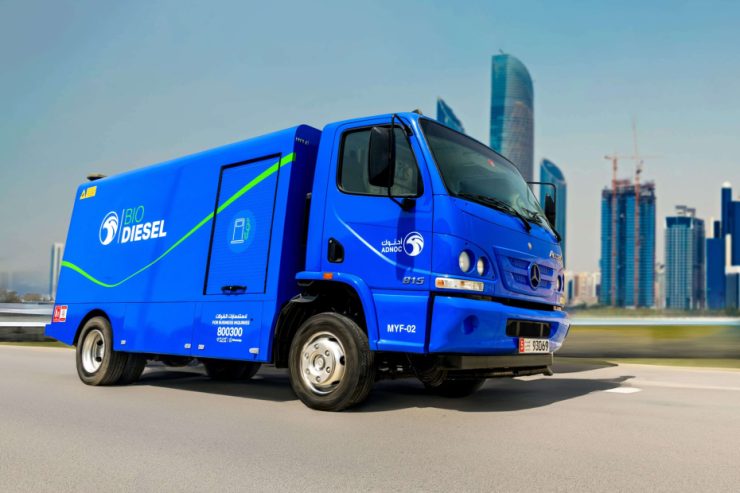ADNOC Distribution said its UAE heavy vehicle fleet will be powered by biofuel, a move that is set to reduce carbon dioxide emissions from the fleet by 15 per cent.
The fleet of the UAE’s largest operator of fuel stations and convenience stores plays a crucial role in supplying fuels and liquefied petroleum gas (LPG) to corporate customers.
The fuel retailer said the use of biofuel is a step forward in the company’s commitment to reduce its carbon footprint and helps ADNOC Group to deliver on its accelerated decarbonisation plan.
“We are delivering on our commitment to using biofuel to power our fleet and help reduce our carbon intensity by 25 per cent by 2030. By incorporating B20 biofuel into our operations, ADNOC Distribution is taking a vital step toward securing a more sustainable future,” said Bader Saeed Al Lamki, CEO of ADNOC Distribution.
Al Lamki said the initiative underscores ADNOC Distribution’s dedication to a future-focused strategy and supports the UAE’s Net Zero by 2050 strategic initiatives.
Produced from waste cooking oil, the biofuel blending process takes place at a state-of-the-art production facility located in Madinat Zayed, Abu Dhabi.
ADNOC Distribution accelerates decarbonisation
Meanwhile, ADNOC Distribution converted a $1.5bn (Dhs5.5bn) term loan into a sustainability-linked one in January, committing to a penalty/incentive approach that ties the loan to sustainability indicators.
With a reduction in greenhouse emissions intensity as one of the loan’s two key performance indicators, decarbonisation represents both a strategic imperative and a financial commitment for the company.
The Abu Dhabi-based firm is actively developing innovative sustainable mobility solutions, including electric vehicle (EV) charging infrastructure. It currently operates 38 EV charging points at service stations across the UAE.
Furthermore, ADNOC Distribution partnered with TAQA to establish E2GO, a mobility joint venture, to build and operate EV infrastructure in Abu Dhabi and the wider UAE.
The company continues to provide alternative fuel options, including compressed natural gas, across its network. Last year, it launched its Voyager Green Series range of lubricants made from 100 per cent plant-based base oil, aligning with its commitment to expand its sustainable and eco-friendly product.
Financial performance
In September, ADNOC Distribution’s board of directors approved an interim dividend of $350m (Dhs1.3bn) for the first six months of 2023, equivalent to 10.3 fils per share.
The interim dividend represents the first part of the expected full-year 2023 dividend payment of a minimum of $700m (Dhs2.57bn), which is equivalent to 20.57 fils per share, in line with the company’s dividend policy.
The second and final dividend for 2023 is expected to be paid in April 2024, subject to the board’s recommendation and shareholder approval. The company’s dividend policy for 2024 and beyond sets a dividend payout of a minimum of 75 per cent of distributable profits.
Since its IPO in 2017, the company has paid a total of $3.7bn (Dhs13.6bn) in dividends, including the H1 2023 dividend.
The company’s H1 2023 revenues rose by 4.9 per cent year-on-year to Dhs16.1bn while its profits plunged by 16.2 per cent to Dhs2.7bn.



